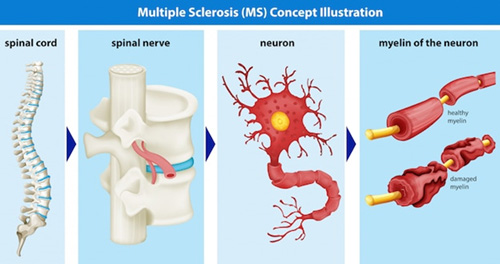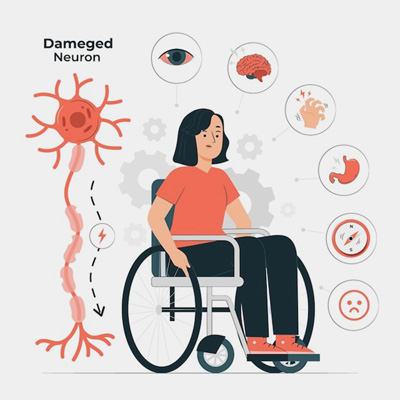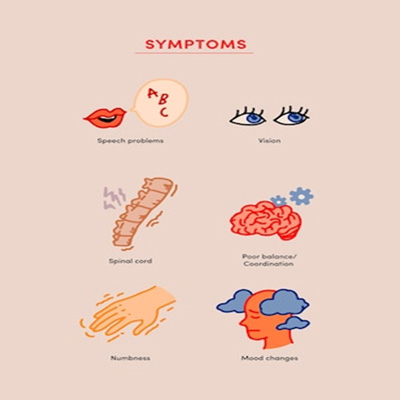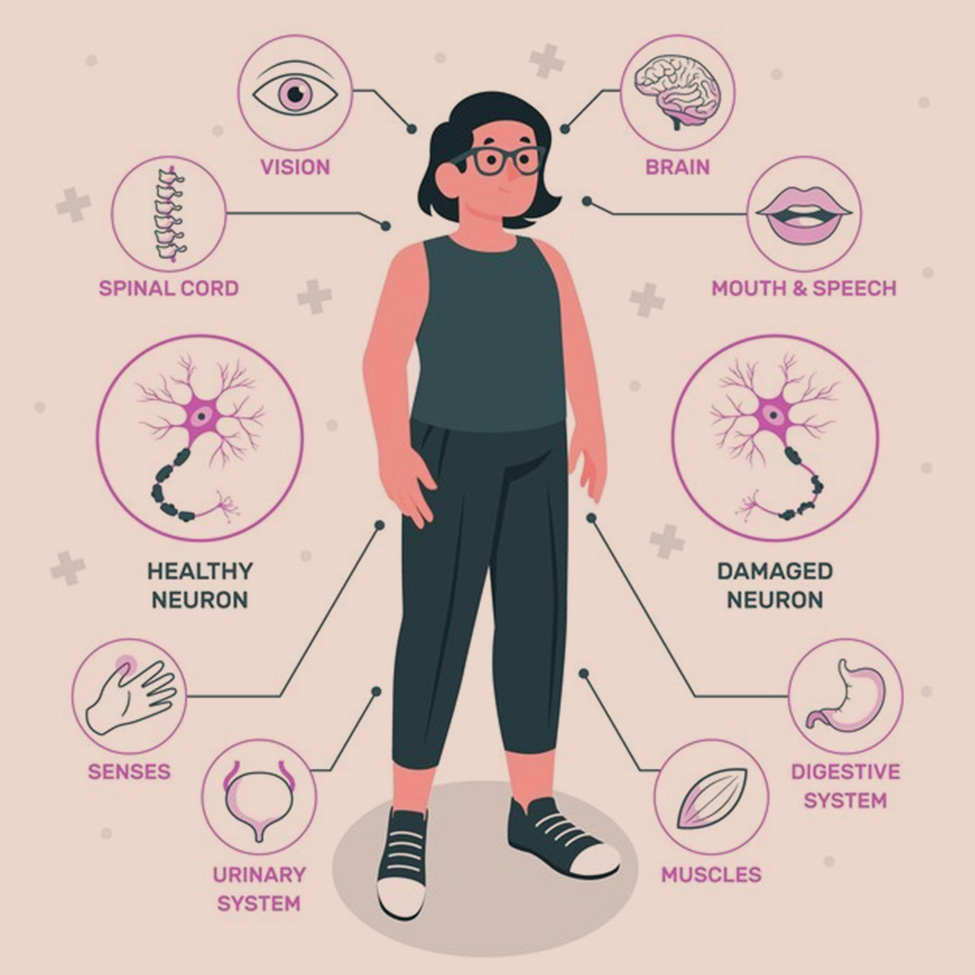Introduction
A Disease in which the immune system damages the protective covering of nerves, it disturbs communication between brain and nervous system, reflected in the form of various kinds of physical as well as mental signs and symptoms.
The main three characteristics of Multiple Sclerosis are formation of lesions in CNS, Inflammation & destruction of myelin sheaths of neurons.

Understanding Multiple Sclerosis
Multiple Sclerosis is characterised by three primary features: the formation of lesions in the central nervous system (CNS), inflammation, and the destruction of myelin sheaths of neurons. The areas commonly affected include vision, spinal cord, senses, muscles, brain, mouth, speech, digestive system, and urinary system.
Risk Factors
Heredity, young age (14-45 years), White Race, Lack of vit D, Autoimmune Diseases (Type 1 Diabetes, Thyroid Disease, Intestinal Inflammation) impact of Environmental Factors, Females, Infectious Diseases

Causes of Multiple Sclerosis
The cause is unknown, it’s an immune mediated disease in which body’s immune system attack its own.
Symptoms of Multiple Sclerosis
- Central: fatigue, less concentration (cognitive impairment), depression, anxiety, unstable mood,
- Visual: Rapid involuntary movement of eye (nystagmus), optic neuritis, diplopia,
- Speech: dysarthria (speech difficulty)
- Throat: dysphagia (swallowing difficulties)
- Musculoskeletal: weakness, spasms, ataxia
- Sensations: pain, hypoesthesia, paresthesia,
- Bowels: incontinence, diarrhoea / constipation
- Urinary: incontinence, frequency / retention


Diagnosis
- MRI Brain
Detect lesions or plaques
- Lumbar Puncture
Cerebral fluid, It can provides evidence of chronic inflammation in CNS
Homeopathy and Multiple Sclerosis
Homoeopathy offers a supportive approach to managing Multiple Sclerosis , focusing on alleviating symptoms and improving the overall quality of life for patients.
Homoeopathic Medicines for Multiple Sclerosis
- Gelsemium & alumina
- Difficulty in balance
- Lack of muscle coordination
- Intense dizziness
- Alumina for sluggishness with staggering gait
- Falling on closing of eyes
- Numbness in legs
- Argentum Nitricum & Conium
- Weakness in lower limbs
- Guiding symptoms for conium-weak & weary legs, sudden loss of strength, stiffness in legs
- Argentum- weakness in calf muscles, rigidity in calves, unsteady walk, heaviness of limbs, limbs feels like they are made up of wood.
- Lathyrus Sativus
- For spasticity in legs, accompanied by trembling while walking, cramps in legs
- Lower limbs may show emaciation
- Picric acid & Oxalic Acid
- For numbness, tingling, pin/needle like sensation
- Oxalic acid - in tingling & trembling of hands
- Weakness & coldness in lower limbs
- Picric acid - pain feels like needle-like or pin sensation, marked prostration, muscle weakness, spasm, weakness worse with exertion, burning sensation in spine.
- Gelsemium & Physostigma
- Multiple sclerosis with eye symptoms
- Physostigma - in dim vision & pain in eyes, on the other hand gelsemium is the best in blurred vision, double vision with multiple sclerosis.
Benefits of Homoeopathic Treatment
- Individualised Care: Homoeopathy recognizes that each person is unique. A homoeopath will assess your symptoms, medical history, and lifestyle to prescribe a personalised treatment plan tailored to your needs.
- Gentle and Natural: Homoeopathic remedies are derived from natural substances and are known for their minimal side effects. They work in harmony with the body, promoting self-healing and overall well-being.
- Holistic Approach: Homoeopathy takes into account not only the physical symptoms but also the emotional and mental aspects of an individual. It aims to restore balance at all levels, providing comprehensive care.
- Long-Term Relief: By addressing the underlying causes of Ulcerative Colitis,homoeopathy strives to achieve long-term relief and improved quality of life.
Consulting a Homoeopath
For effective treatment of Multiple sclerosis with homoeopathy, it's essential to consult a qualified Sanjivani homoeopathic physician. Treatment is highly individualised, and a thorough history and symptom analysis are necessary to select the most appropriate remedies. A Sanjivani professional can provide a personalised treatment plan, ensuring optimal symptom management and improvement in quality of life.
Sanjivani Homeopathy Clinic USP
- No homoeopathy Dietary Restrictions:
Allows patients to enjoy foods like onion, garlic, and coffee, ensuring a stress-free treatment journey.
- 24/7 Online Consultations:
Enables convenient access to doctors with detailed counseling, history management, and follow-ups.
- Highly Skilled Team:
Experienced BHMS and MD doctors, supported by multilingual and professional staff.
- Patient-Centric Care:
Simplifies treatment with modern, adaptable solutions and clear communication.
Click Here for Detailed "Sanjivani USP"
FAQ's
- What is homoeopathy ?
Homoeopathy is a holistic science which belives in the law of Similia Similibus Curenter i.e Like Cures Like .It was discovered by Dr Samuel Christian Hahnemannn in 1796.
- Is there any side effects of homoeopathy?
As homoeopathic medicines are made from natural substances this medicines have no side effects and are completely safe to consume
- Is there any diet restriction to take homoeopathic medicines?
There are no diet restrictions for homoeopathic medicines. One should only avoid eating or drinking any liquid other than water at least 30 minutes before and after taking homoeopathic medicines.
Click Here for "Frequently Asked Questions."
Conclusion
While homoeopathic treatment is tailored to the individual's unique symptoms and medical history. For proper management of Multiple sclerosis, consulting a Sanjivani professional homoeopathic physician is recommended to devise an appropriate and personalised treatment strategy.
Disclaimer : The information provided in this blog is for educational purposes only and should not be considered medical advice. Please consult with a qualified healthcare professional before starting any treatment for Multiple sclerosis or any other medical condition.


